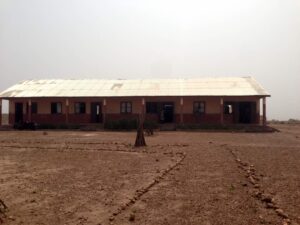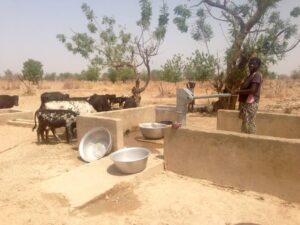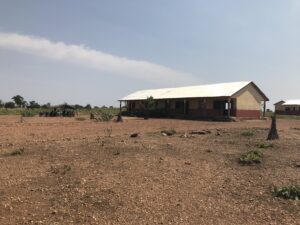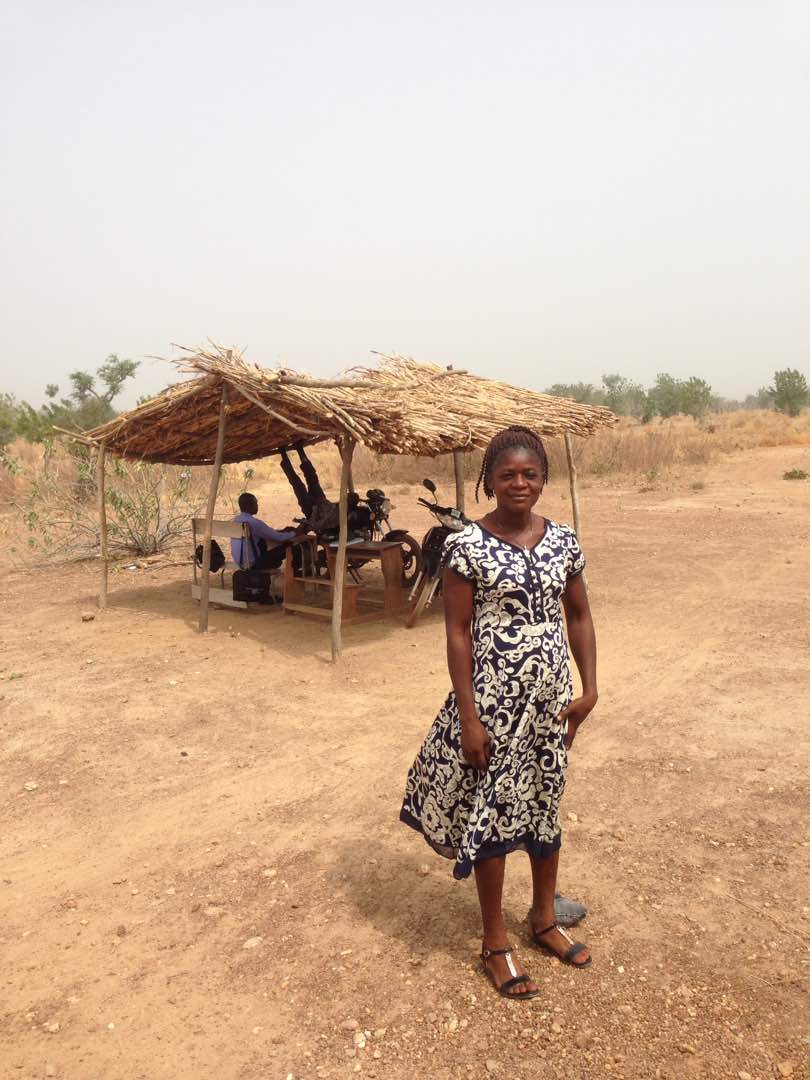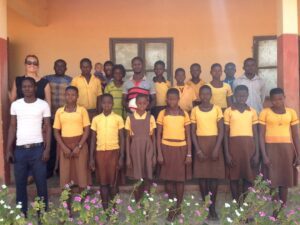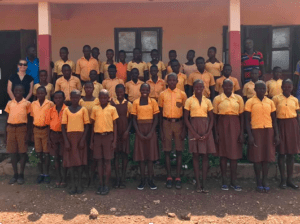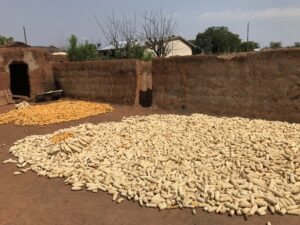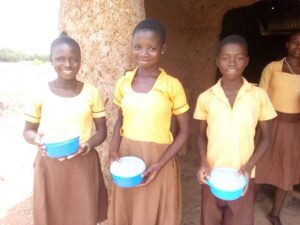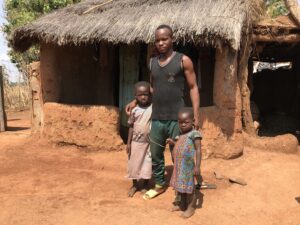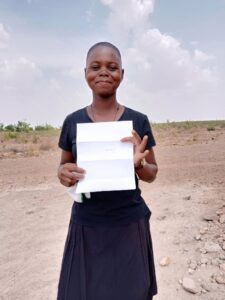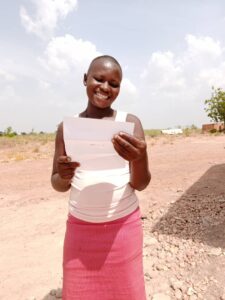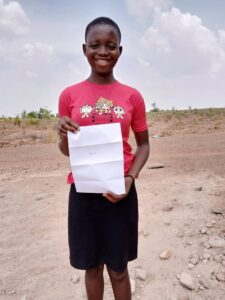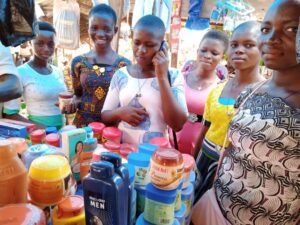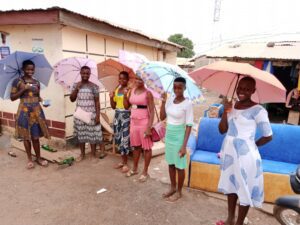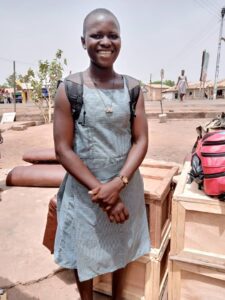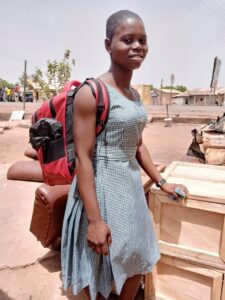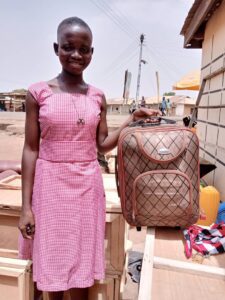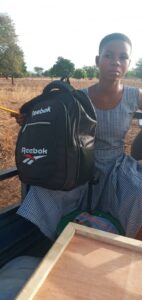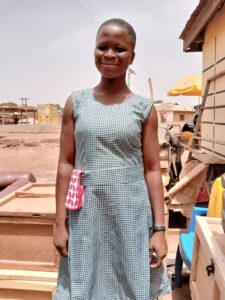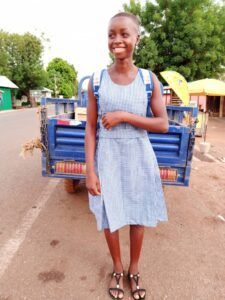In 2017, I spent several days riding around Lawra, searching for the next rural community for ATE to begin working in. It was a boiling hot day in November when we came across Biro, a very rural community, an hour from the centre of Lawra, impossible to access by car, with no electricity, no mobile phone network, endless farmland with clusters of orange buildings and bright green mango trees. Near the centre of this traditional community, we visited Biro Junior High School. A humble 3 classroom block surrounded by empty fields, roaming cows and the occasional woman passing by carrying a basin of water on her head, with none of the usual sounds of learning coming from the school. The headteacher, Irene, had written ATE an emotive letter requesting our support, but i assumed as we approached that the school was abandoned.
As we left our motorbike under an outside building made of sticks, i noticed the most beautiful flowers growing all around the school. In the silence, in the middle of seemingly nowhere, Irene rushed out to meet us. She was passionate, committed, incredibly knowledgeable, and desperate for our help. She took us into her school, into the one class of children, and i couldn’t believe what i was seeing. 12 teenagers, clustered around damaged desks, sharing one battered text book, focusing intently on their learning. This was the full population of the school at that time – 12 children. I was later to learnt that very few children in Biro go to primary school, and even less go on to Junior High School. Instead, they go South in search of work, they farm the land, they marry, they have children of their own. Poverty is deeply imbedded in this community, with many children telling us they often don’t eat all day, some going as many as 3 days without a meal. I was sold.
3 months later we were providing a daily meal at Biro JHS, and 6 months after that, the population of the school had tripled to 36 children. Beautiful, tangible impact.
- Biro JHS – April 2018
- Biro JHS – Sept 2018
We’ve now been working in Biro for 4 years, and we’re incredibly proud of the change we’ve made. As well as providing daily meals, employing 3 cooks, supplying vital learning materials and working relentlessly to get children into school, we’ve set up small businesses, reached out to support disabled children, and funded farmers to grow more food. Biro is still a place of great need, but we’ve made a difference.
- Support to farms
- Children eating at school
- Grants and training to entrepreneurs
The 12 children that i met in 2017 finished their Junior High School education in August, the first 12 young people to complete Biro JHS, and we were determined to support them further. The girls felt like a particularly focus – we know that staying in school is incredibly unlikely and difficult for girls. From as young as 13 or 14 years old, they are under pressure to marry, families wish to receive a dowry in return for them becoming wives. They are often seen to have more value as a wife, than as a student. All 8 told us they did not plan to carry on to Senior High School (SHS) as they didn’t have the financial support they needed. It costs around £300 per year to send a girl to SHS, this is a fortune to a Biro family. Despite this, they were so proud to get their exam results, and all did well:
- Jessica
- Olivia
- Lucy
We were beyond delighted when members of Rotary Clubs in Wiltshire chose to individually sponsor the 8 girls who had completed their exams, to fund them fully for all 3 years of boarding school at Senior High School. It was moment of pure joy when we realised that we could do this for those children, girls who otherwise had absolutely no hope of finding the funds to go to school, girls who deserve the chance to learn.
Amazing Rexford Benon, Hub Manager in Biro, has worked very hard to make the dream of this project become a reality. Bringing the girls home from the South (where they were working), arranging their admittance to Schools, purchasing everything they need, helped them to negotiate with their families, and organising transport.
7 of them have made it school, one is sadly pregnant. For those 7 – they are trailblazers, they are role models, they have a chance of a bright future and I know they will make it. The one who has not been able to start school this year, will receive different support. We will make sure she is ok. You can read about her here: https://ateghana.org/no-wonder-she-gave-up/
If this pilot project goes well (which we are sure it will), and we secure funding, we will role this out to more schools, and repeat for subsequent cohorts. As a staff group, we are deeply engaged in this programme, and emotionally connected to these brave girls who are pursuing education against all odds.
They left for school with joy, and some nervousness! (Bennedictta leaves this week so is not yet pictures in her new uniform).
- Olivia
- Jessica
- Lucy
- Evelyn
- Freda
- Juliana
To the individuals who are funding out girls – from the bottom of our hearts, thank you.
To our girls, you are heroes. We wish you all the luck in the world.
By Sarah Gardner, Chief Executive
